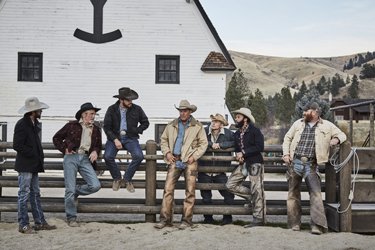
Titus Techera‘s must-read review explains why the television series, now in its third season, makes some serious statements about class warfare and the changing character of the American elite.
Like Hemingway’s marlin, which achieves its greatest leap in its death throes and expires at the top of the arc, [John] Dutton is most impressive in agony. He seems superhuman compared to the new American elites. His handling of urgent problems makes him resemble the president—he is an executive. Meanwhile, egalitarianism has not created equality in America, but only a new elite, impatient, ignorant of the future, blind to necessity—thus, astonishingly able to manipulate the new systems of power, since these elites feel no concern for consequences. The real world, where people are tied to a place, to other people, to their past, and the good they pursue, is replaced by access to the institutions and finances that make the world work, which manipulate people’s lives indirectly, in unaccountable and unpredictable ways. Everyone’s tied into legal demands and their lives are increasingly regulated, but only people who know how to use the law to get what they want get ahead in this new situation. The first post-American elite is coming for the last cowboys. …
The opposite of a man in America is a bourgeois bohemian, to recall David Brooks’s signal contribution to our sociology in Bobos in Paradise (2000). Brooks is a sophist for this class, so he will not tell the ugly truth—but Tom Wolfe did in A Man in Full (1998), and even scooped Brooks. It’s not an accident that he saw clearly: Wolfe was the poet of American Stoicism and understood the threats to manliness.
The people who define elite taste in America are themselves opposed to violence, but not because they are Christian or even moral. It’s because their own rule doesn’t require that they ever take any personal risks—poorer people do that, who live in other parts of town or are completely removed from sight by gentrification. Nowadays, the rich take no responsibility for the poorer or those suffering violence, or even ever shake their hands, which is why our cities are such madhouses. There is no noblesse oblige.
Sheridan wants to show the violence in America to rebuke this bloodless view of things. … we see, through the real estate developer drama, how the new American elite is moving in to remove the last ranchers. This establishes the difference between real men and those who want to rule merely through institutions and finance, as though history had ended and we’re just dividing up luxuries.
RTWT






